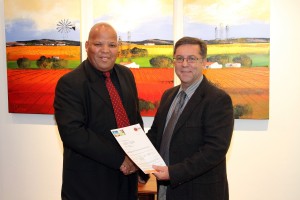Stellenbosch University’s Water Institute (SUWI) and the Energy and Water Services Sector Education and Training Authority (EWSETA) have signed a Memorandum of Agreement to address the critical need for specific technical and management skills in the water and energy sector.

Mr. Errol Gradwell (CEO: EWSETA) and Prof. Eugene Cloete (Vice Rector: Research and Innovation at the Stellenbosch University) during the signing of the agreement
To be phased in over the next three years, the main objective of the programme will be to increase the number of students in scarce-skills areas such as the water and energy sector at Further Education and Training (FET) Colleges in South Africa.
There are currently more than 300 000 students in public FET Colleges and the Department of Higher Education and Training (DHET) targets to increase the number to a million students in the near future. The South African government recently announced an extra investment of R2.5 billion for infrastructure, equipment and programmes for FET Colleges to further strengthen them and gradually turn them into institutions of choice for the youth.
According to Mr Errol Gradwell, chief executive officer of EWSETA, there are many obvious reasons why this project is important and even critical: “There is an urgent need to align the skills mismatch between that required by industry and what is supplied by our education systems. We also need to develop curricula and qualifications to service both the short and long term needs of the industry at large.”
Another important objective of the programme will be to up-skill FET lecturers, increase re-skilling programmes for experienced labour, and up-skill middle to senior managers, he explains.
Prof Eugene Cloete, Vice-rector (Research and Innovation) at SU, said the Water Institute was honoured to be entrusted with the development of this programme. The programme is also in line with the University’s vision for 2030 and supports the broader higher education objectives of the country, he said during the signing ceremony at the university on Monday, 20 May 2013.
According to the Memorandum of Agreement, SU will establish a Water and Energy Programme Office to coordinate the overarching project and manage research and development through to the implementation phase.
With funding of R5,718 million for phase 1 one of the project, experts from the SU Water Institute will be roped in to conduct an educational needs analysis for FET Colleges over the next 12 to 15 months, with training of FET lecturers starting in 2014 as part of phase 2. Phase 3 will focus on an educational needs analysis for water professionals in the private and public sector. Training is planned to be starting in 2015.